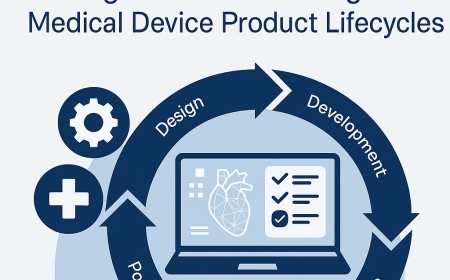Why Developers Still Prefer Microsoft .NET Technologies in the Era of Cloud and AI
In a fast-changing tech environment where cloud platforms and artificial intelligence (AI) dominate the conversation, one development framework continues to stand the test of time Microsoft .NET Technologies. Despite the emergence of newer tools and languages, developers across the globe still rely heavily on .NET to build everything from enterprise applications to cloud-native solutions.
So, what makes .NET so relevant in the cloud and AI era? Lets explore why developers continue to place their trust in this versatile and ever-evolving framework.
What Are Microsoft .NET Technologies?
Microsoft .NET Technologies is a comprehensive, open-source development platform created by Microsoft. It allows developers to build a wide range of applications including web, mobile, desktop, IoT, and cloud-based solutions using languages like C#, F#, and VB.NET.
With the introduction of .NET Core, and now .NET 6/7, the platform has transformed into a cross-platform powerhouse that runs on Windows, Linux, and macOS, making it a preferred framework for both startups and enterprises.
Deep Integration with Cloud Especially Microsoft Azure
Cloud-Native Development Simplified
.NET is designed to work seamlessly with Microsoft Azure, Microsofts powerful cloud computing platform. Whether youre building APIs, deploying microservices, or integrating AI models, .NET offers robust support for cloud-native architecture.
Azure provides native tools and SDKs for .NET developers to easily deploy and manage applications using services like Azure Functions, Azure App Services, and Azure Kubernetes Service (AKS).
Optimized for Scalability
With .NET, scaling an application across servers or containers is smooth and efficient. It supports containerization through Docker and orchestration via Kubernetes, allowing for flexible deployments and high availability key for modern, cloud-first applications.
Embracing AI & Machine Learning with ML.NET
Artificial intelligence is reshaping software development, and Microsoft .NET Technologies is not far behind. Microsoft introduced ML.NET, an open-source, cross-platform machine learning framework for .NET developers.
Use AI Without Leaving the .NET Ecosystem
Developers can now build and train custom ML models using C# or F# no need to learn Python or switch to TensorFlow. This tight integration empowers teams to incorporate AI into existing applications, from predictive analytics to anomaly detection.
Cognitive Services and AI APIs
Beyond ML.NET, .NET developers can also plug into Microsofts Azure Cognitive Services for advanced AI capabilities like vision, speech recognition, language translation, and sentiment analysis all accessible via simple APIs.
Cross-Platform and Modernized with .NET Core & .NET 6/7
One of the most significant transformations for .NET has been its shift from being Windows-only to a truly cross-platform framework.
Unified Development Experience
With .NET 6 and 7, developers now get a single SDK, base libraries, and runtime across all project types whether it's for mobile (via MAUI/Xamarin), desktop (Windows Forms, WPF), web (ASP.NET), or cloud.
This means fewer compatibility issues, faster development, and reduced infrastructure costs.
Performance, Speed, and Security Built-In
Performance is one of the main reasons developers choose Microsoft .NET Technologies over newer frameworks.
Lightning-Fast Execution
The Just-In-Time (JIT) compiler and Ahead-Of-Time (AOT) compilation in .NET result in high-speed execution. Benchmarks consistently show .NET among the top performers in web frameworks.
Trusted Security Standards
.NET includes built-in features like authentication libraries, data protection APIs, and secure communication protocols. With regular updates from Microsoft, security is continuously monitored making it enterprise-ready and compliant with global standards like GDPR and HIPAA.
Huge Ecosystem and Community Support
The .NET ecosystem is vast, mature, and constantly growing. With a massive community of developers and regular contributions from Microsoft and open-source teams, its easy to find solutions, libraries, and support for any challenge.
Developer Tools & IDEs
From Visual Studio and Visual Studio Code to integrations with GitHub and Azure DevOps, .NET developers have access to some of the best tools in the industry.
Debugging, testing, collaboration, CI/CD its all streamlined with the Microsoft development ecosystem.
Compatibility with Legacy and Enterprise Systems
For large enterprises with legacy applications built in earlier versions of .NET, the platform offers excellent backward compatibility. Developers can modernize legacy systems without rewriting the entire codebase.
This makes .NET especially valuable in industries like finance, healthcare, and government, where system stability and long-term support are crucial.
Developer-Friendly Learning Curve
Unlike some newer frameworks that come with steep learning curves, .NET especially with C# is known for its clean syntax, powerful libraries, and extensive documentation.
From junior developers to seasoned engineers, the .NET learning journey is well-supported, making onboarding quicker and productivity faster.
Real-World Use Cases of .NET in Cloud and AI
-
Banking & FinTech: Secure, scalable APIs and microservices architecture using .NET with Azure.
-
Healthcare: AI-powered diagnostics and data analytics built using ML.NET and Azure AI.
-
E-commerce: High-performance, scalable platforms using ASP.NET Core and containerized services.
-
IoT Applications: Cross-platform solutions for smart devices with .NET and Azure IoT Hub.
Final Thoughts: Why .NET Still Leads in a Modern Tech Stack
Despite the flood of new frameworks and AI-first tools, Microsoft .NET Technologies continue to be a reliable and innovative choice. It blends modern development needs like cross-platform support, cloud scalability, and AI integration with enterprise-grade reliability and performance.
For developers and businesses looking for a framework that balances innovation with stability, .NET is not just relevant it's essential.





































